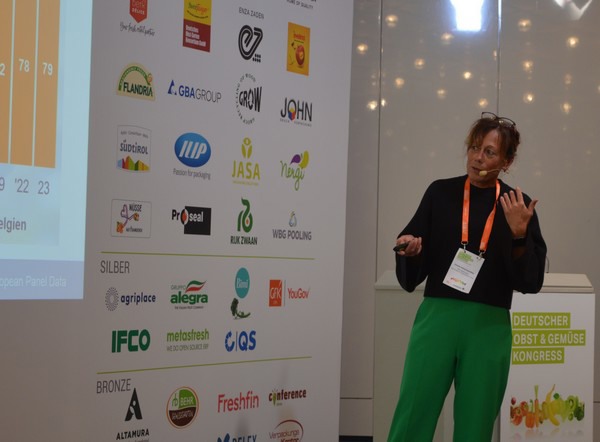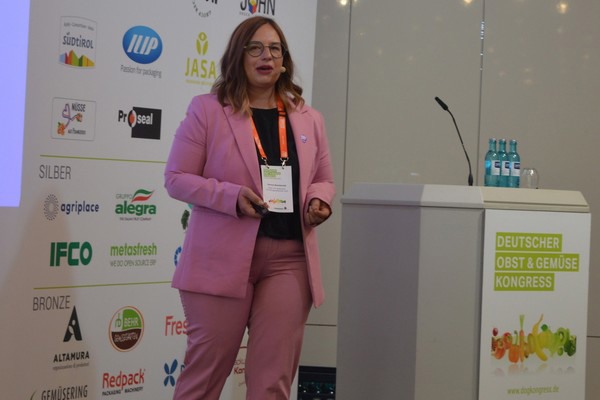In the period 2017-2023, the most important pear-growing countries in Europe recorded an overall decline in production of 20 per cent. The leading pear-growing country, Italy, in particular, has had to cope with several sharp declines in volume, with the disastrous 2023 harvest year as the low point. However, initial, preliminary volume forecasts for the current harvest year indicate a slight recovery in Italian pear production. In the wake of the decline in yields, the market share of the Abate Fetel variety, which has always been the flagship of the Italian pear industry, has shrunk, while Conference has further expanded its lead in many countries, including Germany and the UK, explained AMI market expert Ursula Schockemöhle during a seminar at this year's DOGK in Düsseldorf.
It should be noted that, compared to the premium pear Abate Fetel, the Conference is more in the low-price segment. In the last six years, the consumer price of Conference has climbed from 1.64 to 2.08 EUR/kg, while the price of Abate Fetel has risen from 2.25 to an impressive 3.18 EUR/kg. Following rising prices, the demand for pears in the respective European markets also appears to be trending downwards, with pears losing market share to trend products such as stone fruit, avocados and blueberries, particularly in Italy (-22 per cent), Belgium (-18 per cent) and France (-13 per cent).

Ursula Schockemöhle provided an insight into today's pear market.
High potential for club varieties
In contrast to the apple shelf, there are only a few club varieties in the pear sector. However, in terms of sales in Germany, club varieties appear to be gaining in importance in recent years. "This strengthens our belief that demand can be generated with new pear varieties," commented Schockemöhle, handing over to Janina Bembenek, Marketing Officer at Obst vom Bodensee Vertriebs GmbH and the German Fruit Variety Consortium (DOSK) and thus the driving force behind the successful Xenia club pear. The younger consumer group in particular tends to favour crunchy rather than melt-in-the-mouth pears, with the top fruit category tending to lose market share. "The Xenia club concept was born out of this basic idea. Something simply has to be done, not least for the benefit of the German top fruit sector."
The underlying aim was to 'rejuvenate' the fruit and vegetable department and to communicate the special characteristics of the Xenia variety (sweet flavour, regional production, good shelf life, etc.) accordingly. "However, our aim was to organise the marketing on an emotional rather than functional level," says Bembenek, looking back. The marketing team achieved this with a generous PR stunt at the ISM Cologne Confectionery Fair, which attracted a lot of attention. "One of the consequences of this was that consumers also became ambassadors for our brand by drawing attention to Xenia in their own social media. Ultimately, this also contributed significantly to the likelihood of purchase at the point of sale."

Janina Bembenek has helped shape the marketing campaign behind the Xenia club concept from the very start.
High recognition value for Xenia
In the final Q&A session, AMI expert Schockemöhle went into more detail regarding club varieties. In contrast to apples, there is still a lot of ignorance from consumers about club pears and their advantages. "I also see this as an opportunity for Xenia to create recognition value so that consumers will buy the pear specifically." The general message of the seminar, that the pear has the potential to regain market share, was ultimately confirmed by an audience member and buyer for a leading food retail chain. "We are already seeing good demand for pears, which is undoubtedly also thanks to the great new club varieties, including Xenia."
For more information:
Janina Bembenek
Fruit from Lake Constance / DOSK
Merkurstrasse 7
D-88046 Friedrichshafen
Phone: +49 (0) 75 41 / 970 28 - 0
[email protected]
www.obst-vom-bodensee.de
https://www.dosk.eu
Ursula Schockemöhle
Agrarmarkt Informations-Gesellschaft mbH
Product Manager Horticulture
Tel. (040) 6505595-13
https://www.ami-informiert.de/
